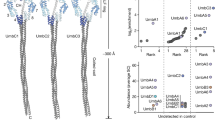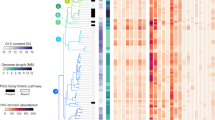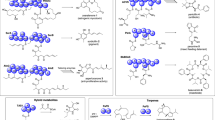Abstract
EARLY in 1959 we obtained through the courtesy of Dr. D. Brewer of the Atlantic Regional Laboratory a non-sporulating strain of Pestalotia ramulosa v. Beyma, an imperfect fungus belonging to the order Melanconiales. This strain was received as Truncatella ramulosa (v. Beyma) Steyaert, and is present in the Agricultural Research Service Culture Collection as NRRL 2826. When originally isolated by Brewer1 from the tailing trough slime of a paper mill in New Brunswick, Canada, the organism formed spores typical of the species, but became asporogenous during subsequent transfers.
This is a preview of subscription content, access via your institution
Access options
Subscribe to this journal
Receive 51 print issues and online access
$199.00 per year
only $3.90 per issue
Buy this article
- Purchase on Springer Link
- Instant access to full article PDF
Prices may be subject to local taxes which are calculated during checkout
Similar content being viewed by others
References
Brewer, D., Canad. J. Bot., 36, 941 (1958).
Author information
Authors and Affiliations
Rights and permissions
About this article
Cite this article
BENJAMIN, C., STODOLA, F. Ramulosin, a C10H14O3 Compound produced by the Fungus Pestalotia ramulosa . Nature 188, 662–663 (1960). https://doi.org/10.1038/188662a0
Issue Date:
DOI: https://doi.org/10.1038/188662a0
This article is cited by
-
Isolation and identification of an endophytic fungus Pezicula sp. in Forsythia viridissima and its secondary metabolites
World Journal of Microbiology and Biotechnology (2014)
-
Phytoalexins and other natural products as factors in plant disease resistance
The Botanical Review (1972)
Comments
By submitting a comment you agree to abide by our Terms and Community Guidelines. If you find something abusive or that does not comply with our terms or guidelines please flag it as inappropriate.



